March 28, 2017
You Can Choose to Refuse
• Opt Out 2017: Refusing Education as a Police Power • Eight Reasons to Opt Out • Demand Equality and Justice for All
Opt Out 2017:
Refusing Education as a Police Power
"The essence of test-based education policy is not accountability but punishment. Punishment is about control, about regulation; the right to punish is a police power…Tests are less about demonstrating what one knows, understands or is able to do, and more about enforcement of a particular future that no reasonable person accepts or wants."
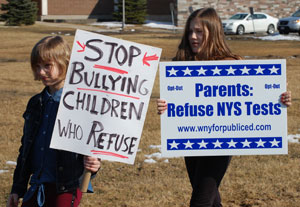 The Opt Out movement is more important than ever. Why? There are several reasons. First, despite what the New York State Education Department (NYSED) is saying, and despite promises that the federal Every Student Succeeds Act (ESSA) will reduce testing demands, this year's tests already have and will continue to negatively affect students, teachers, principals and parents in numerous ways. The tests still narrow how and what teachers teach, and what students are supposed to learn. Test results will be used to determine school status under the state’s receivership law. This will affect the fate of hundreds of schools across the state, including the possibility of school closure or conversion to a charter school. Further, as NY’s Annual Professional Performance Review (APPR) still remains law, this year’s scores could be used to evaluate educators in subsequent years, when the moratorium on the use of test data to evaluate educators is ended.
The Opt Out movement is more important than ever. Why? There are several reasons. First, despite what the New York State Education Department (NYSED) is saying, and despite promises that the federal Every Student Succeeds Act (ESSA) will reduce testing demands, this year's tests already have and will continue to negatively affect students, teachers, principals and parents in numerous ways. The tests still narrow how and what teachers teach, and what students are supposed to learn. Test results will be used to determine school status under the state’s receivership law. This will affect the fate of hundreds of schools across the state, including the possibility of school closure or conversion to a charter school. Further, as NY’s Annual Professional Performance Review (APPR) still remains law, this year’s scores could be used to evaluate educators in subsequent years, when the moratorium on the use of test data to evaluate educators is ended.
The undemocratic and harmful Common Core standards remain, and annual testing remains a main vehicle for their imposition. NYSED has also indicated that it plans to require a statewide computer-based testing system. Among other things, this is a means to facilitate the collection and sharing of individually identifiable student data (recall inBloom). Schools continue to be pressured to teach to the test, and some teachers and administrators are pressuring parents to have their child(ren) take the tests.
All of this harms the quality of education and does nothing to solve the real problems that concern parents, educators, students and their communities. A summation of existing research suggests that test-based accountability systems do not serve to improve the quality of education; annual testing has not been demonstrated to help educators do a better job. Yet, state and federal authorities continue to pursue a direction that the vast majority of students, parents and educators have clearly opposed. Test refusal is an important means to block this undemocratic direction and for building public consensus regarding an alternative.
Testing as a Police Power
 But there is something far more significant going on. The particular form of contemporary testing and the particular manner in which it is now being used reveals and is consistent with much larger governance changes.
But there is something far more significant going on. The particular form of contemporary testing and the particular manner in which it is now being used reveals and is consistent with much larger governance changes.
As has long been recognized by students, parents and educators, the essence of test-based education policy is not accountability but punishment. Punishment is about control, about regulation; the right to punish is a police power. The governance of education increasingly takes the form of policing. More and more, school is about compliance, and more and more, this compliance is organized via tests (and “data”) of some kind.
Tests are less about demonstrating what one knows, understands or is able to do, and more about enforcement of a particular future that no reasonable person accepts or wants. For example, few will argue that schools should narrowly focus on preparing students for “college and career” — parents have long desired an educational experience that is well-rounded, preparing their children not only for work and future study, but for a wide variety of adult roles and activities, including art, music, sports, etc. Much of the opposition to the Common Core originated in the fact that it portended a future for youth limited (at best for most) to being a robot temp worker in the global economy.
Let us be clear: the issue is not whether or not educators should use data to make decisions regarding what is taught and how teachers should go about their work. The issue is that “the data” (whether test score, attendance record, or a student’s “grit score”) has become a means by which students and educators are policed. (Scientists do not use data to punish the subject of their investigation.)
Federal and state policy on use of data is in fact bad science. For example, ESSA demands that states rank their schools on the basis of data such as test scores, attendance, and teacher absenteeism. Mass confusion has been created by NYSED and others who render the issue as one of which indicators are most valid for ranking purposes. Yet, ranking is not nor can it ever be a form of measurement; ranking schools is both fraudulent and harmful no matter what indicators are used (e.g., some are proposing “opportunity to learn” metrics).
All this is a means to block students, parents, educators and community members from having a say and having an active role. This point is made very clear by the data-advocacy of the notorious consulting firm McKinsey & Company. Data and algorithms, they say, should replace human decision making.
Data as Behavior Enforcement
At nearly every turn, “the data” is not used to shed light on a situation, but rather to impose a view of the world consistent with the “reformers’ vision” (e.g., educators should ignore racism and poverty and instead focus on “achievement gaps” and “growth mindsets”). This “data” constitutes the stimulus to which educators are told they must respond. Those who do “what the data tells them” are promised (but frequently do not receive) rewards; those who do not comply face punishment and humiliation.
In other words, the “data” connected with all the testing — benchmarks, formative tests, end of course tests, state tests, nationally normed tests, common core aligned or not — is not about providing information. We are to be data managed, not data informed. In fact, the above pattern now applies to many spheres of life: credit card points and credit scores; health records and the various incentive schemes of insurance companies; the use of social media to regulate conduct. (And the metrics for each scheme are suspect.) All of these are forms of policing, and they are done outside the bounds of publicly legitimated law or public oversight. These are non-public means for regulating behavior.
Because “data” is not a person, emphasis on “the data” masks who in fact is behind all the policing by way of the data. Data appears as neutral and unconnected to forms of power. This hides the fact that more and more of education is being governed by private entities (e.g., technology monopolies) and various executive authorities outside the public sphere and thus unaccountable to the public. The practices now imposed on schools do not emerge from laws legitimated on the basis of public opinion. Public opinion has long been opposed to the test and punish regime. Police power, it should be noted, is not legitimated on the basis of public opinion, as is law. Police power exists to protect the state.
The Next Phase of Opt Out
 Already in the works are initiatives to move from annual testing to continuous testing via various digital online platforms (e.g., Chromebooks, iPads). The advocates of “personalized learning” and “competency based education” (all rooted in B. F. Skinner’s radical behaviorism and ideas about “teaching machines”) are poised to “transform” education via online courses, “flipped classrooms,” and data “badges,” motivating students with “scholar dollars” via online dashboards. Their goal is for all students to be connected to a device, all the time (see the push for “one-to-one” initiatives subsidized by public dollars).
Already in the works are initiatives to move from annual testing to continuous testing via various digital online platforms (e.g., Chromebooks, iPads). The advocates of “personalized learning” and “competency based education” (all rooted in B. F. Skinner’s radical behaviorism and ideas about “teaching machines”) are poised to “transform” education via online courses, “flipped classrooms,” and data “badges,” motivating students with “scholar dollars” via online dashboards. Their goal is for all students to be connected to a device, all the time (see the push for “one-to-one” initiatives subsidized by public dollars).
Various technology and entertainment monopolies (including Pearson and Disney), venture capitalists and even some major teachers’ unions have signed on to this plan. These plans reduce the role of teacher to data watcher and data responder, where curriculum, homework, essay grades, etc., are assigned by the computer. For advocates of “personalized learning” education is characterized by constant and continuous data collection and manipulation — every keystroke, every mouse click is used by the computer to regulate teacher and student behavior. ESSA promotes “personalized learning” and the digital takeover of schools.
Opt Out needs to be ready. These powerful “reform” advocates are happy to end the discredited and “one size fits all” testing regime. They are happy to end one-time, high stakes tests. Their rhetoric is emancipatory and seductive, and they have vast resources to push their agenda. It is key that everyone carefully examine the “personalized learning” movement. It is the data they want as it is their means of control. For Opt Out, test refusal will become data refusal.
The standard that the Opt Out movement should use to gauge its own progress in bringing about change is the degree to which students, parents, educators and the public have created alternative visions to those of so-called reformers, working out mechanisms for public deliberation, participation and democratic control of education with equal membership and rights for all.
[TOP]
Depending on your state, it is that time again — time to waste students' school time on the Big Standardized (BS) Test. Whether it is the PARCC or the SBA or whatever mutant offspring of the testing industry that your state prefers, it is headed your way like a hungry wildebeast.
Maybe you have opted your child out in the past. Maybe you have thought about it, but ultimately decided not to. Maybe you have even become comfortably numb about test-driven education. Consider opting out this year.
If you want to find out the specific mechanics of opting out in your state, just google "Opt Out" and your state. For instance, if I look for "Opt Out Pennsylvania," I find the basic instructions for the steps I must take to opt my children out of testing (since my children are currently Negative 3 Months old, it won't be an issue this year, but I like to be prepared).
If you opt out, you may well get grief and pushback for your choice. Here is why you should do it anyway.
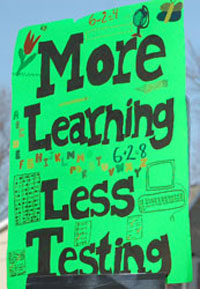 1) No Benefits for Children or Parents
1) No Benefits for Children or Parents
Your child is not allowed to discuss specifics of the test with anyone, so there will be no after-test conversation that would help her glean lessons through reflection. Your child will not get any specific feedback telling her which answers she got right, and which she got wrong. You will not get any feedback on the test except a single blanket score between 4 (super-duper) and 1 (not so great). Once this test is done, you will not know anything about your child that you did not already know.
2) No Benefits for Teachers
In most states, we are not even allowed to lay eyes on the test, and we will receive a single score for your child. All of this is useless. We will learn nothing about your child, and nothing about your child's class (except how well they did on this test). If an administrator or a teacher tells you that the test results will give them valuable information about your child, ask them why they have not already collected that information by other means and if not, what they've been doing for the past eight months.
3) Wasted Time and Resources
What could your student have done with the time spent on preparing for the test, drilling for the test, taking the test? What could your state and local school system have done with the millions of dollars spent on giving the test? Students, parents and schools are paying big in both financial and opportunity costs.
4) Warped View of School and Life
Test-centric schooling leaves our students with the impression that they go to school to learn how to pass the test, and then to take the test. That is a terrible model for learning and for life. Contrary to what test supporters say, life is not all about standardized tests. You will not take a bubble test to get married or to have and raise children. Whatever your career, it will not involve a steady daily diet of test prep and test taking. Show your child that the Big Standardized Test is not the point of school.
5) Do Not Negotiate with Hostage Takers
You may hear that your child must take the test because otherwise it will hurt the school or the classroom teacher. This is simply hostage taking. And it's important to remember that every year this continues, schools and teachers continue to pay a price — in time, in money, in the growth of a pervasive toxic test-driven atmosphere. This argument is a bully who says, "If you don't let me beat this kid up, I will beat him up even more." In any bullying situation, the person to blame is not the victim the person that the bully uses as an excuse to bully. The problem is not that your child is not taking the test — the problem is the state that is threatening to punish the school and teachers. Deal with the real problem; do not enable it.
6) Privacy Matters
This is certainly not the only mechanism being deployed to capture, collect and monetize data about your child. In fact, many folks who position themselves as opponents of BS Tests are actually doing so to build a case for other data collecting methods (but we will talk about Competency Based Education another day). But opting out is certainly one clear and immediate way that you can keep some of your child's data out of the hands of the Big Data miners.
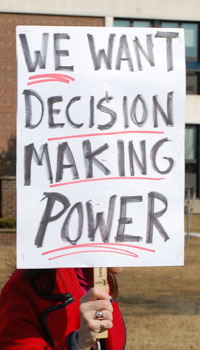 7) The Value of Non-compliance
7) The Value of Non-compliance
In this day and age, it is never too early for a child to learn that sometimes people in authority will demand that you comply with dumb actions. Unthinking compliance is unwise. It is good for all citizens to learn to say "no," and the Big Standardized Test is a good practice case for all the reasons listed above. Compliance is not a virtue in and of itself; this is a great chance to practice rebelling just a little.
8) Be a Snowflake
It is true — your opting out may well not get your state or school district to change policy, may not recapture all the time and money being lost to testing, may not change the course on which we are currently set. But then again — if you are one among many, it might. Put enough snowflakes together and you get an avalanche that crushes everything in its path.
The requirement to make schools test-centric, to put bad tests at the center of school's existence is foolish, on the order of demanding that all students wear silly hats. At this stage of the game, there can be no doubt — there are no benefits to the test and many unnecessary costs…It is time to make your life a source of friction in the machine.
This year, whether it is for the first time or the tenth, Opt Out.
[TOP]
Demand Equality and Justice for All
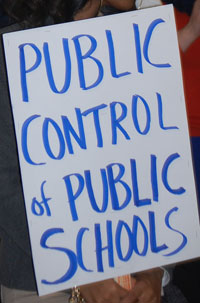 Walking Man why fight these NCLB, RTTT and ESSA education reforms?
Walking Man why fight these NCLB, RTTT and ESSA education reforms?
Fight because, reforms pushing Charter Schools, Vouchers, the Common Core, and endless Standardized Testing harm our children.
Fight because, for 15 years these reformers have failed our children, parents, teachers, and our most needy public schools.
Fight because, these reformers provide cover for injustice and inequality in our public schools.
Fight because, these reformers have turned our children into data and profits for CEO vulture profiteers.
Fight because, placing emphasis on High-Stakes Testing labels and tracks Black, Brown, Poor, and Special Education children into failure.
Fight because, education reform history and data have always demonstrated new rigorous standards and new high-stakes testing are merely more of the same old failed 100-year-old promises. Promises that have always done more harm than good.
Fight because, they limit imagination.
Fight because, they reduce a child’s myths, dreams, and hopes to data.
Fight because, their push for endless rigor is killing laughter and love in our public schools.
Walking Man why are you fighting these education reformers?
I have fought against these reformers under three Presidents: Bush, Obama, and now Trump.
I have fought against the education reforms of the five United States Secretaries of Education, Page, Spellings, Duncan, King, and now Betty DeVos?
I fight because their "Achievement Gap Policies" are a moral rejection of that first and foremost fundamental truth to "Do No Harm."
We Americans need to start asking our leaders; why school choice policies without equity have become the core of their education reforms?
Walking Man, how can we recognize harmful education reform?
 Any education reform insisting that school resources do not matter?
Any education reform insisting that school resources do not matter?
Harms our children.
Any education reform insisting that class sizes do not matter?
Harms our children.
Any education reform insisting that poverty does not matter?
Harms our children.
Any education reform insisting that classroom resources do not matter?
Harms our children.
Any education reform abandoning and forcing our nation's poorest schools to close; while giving billions and special treatments to private entities to replace those schools with for profit schools.
Harms our children.
Any education reform that supports programs that place new teachers with less training and preparation in our poorest and most needy schools.
Harms our most vulnerable children.
Any education reform that spends hundreds of billions on reform programs to promote higher test scores as the solutions to childhood trauma, inequity, poverty, and the "School to Prison Pipeline."
Harms our children.
Any education reform that fails to powerfully support Music, Art, and Physical Education for all in our public schools.
Harms our children.
Any education reform that blames children, parents, teachers, and local public schools as the problem.
Harms our children.
Any education reform that fails to stalwartly support our nation's public school "First Responders," Parents, School Nurses, School librarians, Counselors, Special Educators, Literacy Specialists, Classroom Teachers, Music and Art Teachers, Para-Professionals, Custodians, Principals and Vice Principles.
Harms our children.
Any education reform that tracks and labels children.
Harms our children. […]
Are there education reforms we should fight for?
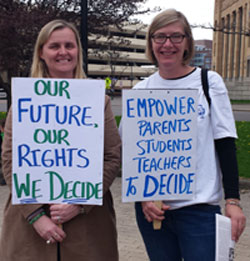 We should fight for education reforms that demand equality and justice for all children.
We should fight for education reforms that demand equality and justice for all children.
We should fight for reforms that demand art for all.
We should fight for reforms that demand music for all.
We should fight for reforms that demand physical education for all children every day.
We should fight for reforms that demand we reduce class sizes.
We should fight for reforms that demand special education services for every child in need.
We should fight for reforms that demand more Librarians, Media specialists, Literacy Specialists, Counselors, Math Tutors, and School nurses.
We should fight for reforms that demand that all schools be modern, clean and safe.
We should fight for reforms that demand wrap around services in poor public schools.
We should fight for reforms that demand summer education and recreational programs for all children.
Walking Man, have an idea in mind?
Let us all walk out.
Let us all Walk Out, Walk back in, and hold an all day Teach-in.
Imagine every parent, every student, and every educator walking out, then walking back in, and then skipping those old lessons, and holding a Teach-in Day across America in 2017.
What would such a Walk Out/Teach-in look like Walking Man?
First it means, no one stays home, no one abandons our public schools, or fails to educate our students. It would be a symbolic walk out, a walk right back in to teach about our nation's long struggle for equality and justice in our public schools. This walk out/teach-in requires parent organizations and community grass roots activist groups be deeply involved in the planning of all walk out, and the teach-in events. To be not just supporters, but active participants from start to end.
We should "Walk Out" again as the last school bell sounds, and go rally for education reform that respects children, teachers and our public schools at our state capitols. […]
These education reforms that reduce children to data and profits would crumble.
A simple democracy truth to power. The people hold the key to change not policy makers or legislators.
When we the people act together our children win. […]
What if no one walks out?
It does not matter as long as one parent is fighting back against education reforms that are harming our children.
Truth to power matters.
It does not matter as long as long as one teacher is fighting back against education reforms that are demoralizing and harming our teachers.
Truth to power matters.
It does not matter as long as one citizen is fighting back against education reforms that harms public education.
Truth to power matters.
As long as one person is fighting back hope lives.
Walking Man what can I do?
Coretta Scot King said: “I must remind you that starving a child is violence. Neglecting school children is violence. Punishing a mother and her family is violence. Discrimination against a working man is violence. Ghetto housing is violence. Ignoring medical need is violence. Contempt for poverty is violence.”
You can reject the violence of:
Hunger,
Public school neglect,
Punishing mothers,
Discrimination,
Ghetto housing,
Lack of health care, and
Finally you can reject the violence of poverty at every step. […]
[TOP]
